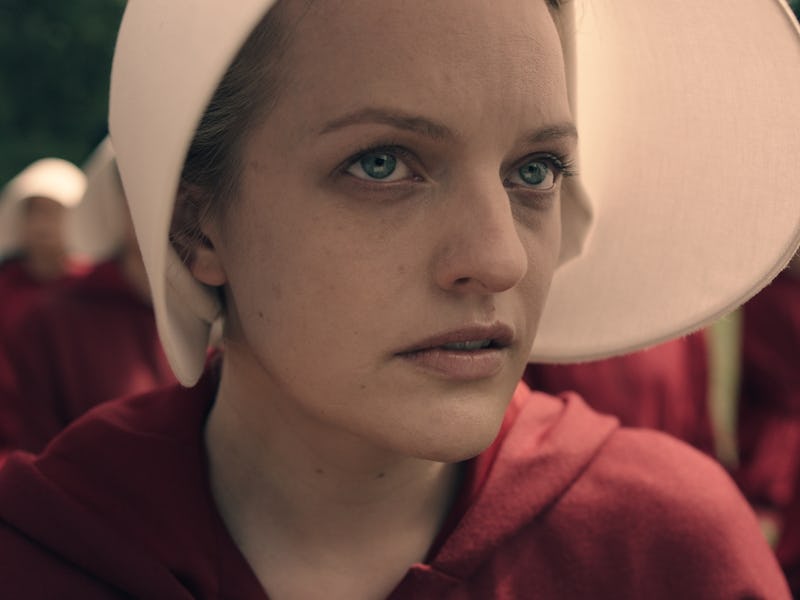Elizabeth Moss Calls 'The Handmaid's Tale' Humanist, But It's Not
At a recent Tribeca panel, the cast wavered on the story's feminism and politics. That shows why we still need it.

Margaret Atwood’s 1985 novel, The Handmaid’s Tale, is widely considered to be a feminist classic. Scan the syllabus of any university course on gender studies, and its signature red cover is bound to pop out. But in a recent panel at Tribeca Film Festival, cast members of the upcoming television adaptation showed that they could use a brush-up on the story’s message. This isn’t to say their comments were thoughtless — but rather, in shying away from the term “feminism” and the idea of “being political,” they inadvertently demonstrated our continued need to take a look at The Handmaid’s Tale.
At the panel on Friday, Elizabeth Moss, who stars as Offred, told the crowd, “For me, [The Handmaid’s Tale is] not a feminist story. It’s a human story because women’s rights are human rights. I never intended to play Offred as a feminist. … Offred’s a wife, a mother, a best friend.” She did not explain why being a feminist negates one’s wifehood, motherhood, or ability to build friendships.
Women’s rights are indeed human rights — she’s correct there — but as The Handmaid’s Tale illustrates, a society that ignores the needs of one group in order to serve another group (by calling that latter group “the majority”) is in dangerous territory. The Handmaid’s Tale takes the forever-relevant real-world concept of systemic sexism and simply turns the dial up.
In this futuristic version of America, everything from the way a woman dresses to how she spends money to her sexual habits is policed and monitored. The women of The Handmaid’s Tale are cast in strict societal roles according to their usefulness to men. Handmaids simply exist as bodies for powerful men to impregnate. Men are victims in Atwood’s story too, but by virtue of living in a society that privileges their gender, they get more autonomy than women.
Both the show and Atwood’s novel highlight how this world is an unpleasant place for men and women, and feminism focuses on the negative effects of the patriarchy (which does not mean “men”) on people of all genders. To say The Handmaid’s Tale isn’t a “feminist story” because it addresses men too is to fundamentally misunderstand feminism.
So, one of two things happened at Tribeca this week: Either Elizabeth Moss purely doesn’t understand what feminism is, or she was told to distance the show from “political” terms like “feminism” in order to broaden its marketability. Neither option is great.
To her credit, Margaret Atwood has confirmed her story’s feminism while not making an enemy of possible readers and viewers. In a New York Times essay reflecting on her novel’s meaning in the age of Trump, Atwood writes, “Is The Handmaid’s Tale a “feminist” novel?…If you mean a novel in which women are human beings — with all the variety of character and behavior that implies — and are also interesting and important, and what happens to them is crucial to the theme, structure, and plot of the book, then yes.”
On one point, Moss is correct: Atwood’s creation, Offred, is not a politically active woman. But that’s why its impact is so strong. The novel, despite its protagonist not having a political vocabulary, demonstrates that, for many members of our population, being political is not a choice. One recalls the second-wave feminist rallying cry from the 1960s, in which American women said, “the personal is political.”
When the society you live in marginalizes you and people like you, it makes a choice for you, one that you’re obligated to comply with or persist against. Atwood uses the language of marginalization in her novel, like when Offred says, “We were the people who were not in the papers. We lived in the blank white spaces at the edges of print. … We lived in the gaps between the stories.”
Elizabeth Moss as Offred in 'The Handmaid's Tale'
Offred is deliberately framed an everywoman rather than a revolutionary. As she walks past a wall bearing hanging bodies — executed for crimes like practicing a different religion or being a “gender traitor” — she acknowledges a selfish feeling of relief that her missing husband is not among them. At one point in the novel, the man who essentially owns Offred explains the philosophy behind this new political structure: “Better never means better for everyone,” he says. “It always means worse, for some.”
This line boils the story’s conflict to its most basic level: While the cautionary tale could resonate with members of any marginalized community, the narrative hones in on the experience of women, specifically. To discount that is to miss the point. As writer Rachel Handler says on Twitter about the Tribeca panel, “The Handmaid’s Tale cast is All-Lives Matter-ing their show,” or rather, arguing that illustrating one social group’s needs somehow ignores and devalues anyone else who has needs. In response to the rise of “All Lives Matter” rebuttals, many “Black Lives Matter” theorists qualified that their slogan has an implicit “too” tacked onto the end.
The Handmaid’s Tale is a feminist story precisely because it shows that women’s rights are human rights, precisely because it shows how nonpolitical people become political when others impose on their basic rights and existence.
In the show, when Moss’s Offred is given the opportunity to join an underground rebel network, she says, “I’m not that kind of person.” The woman who invites her responds, “No one is until they have to be.” Perhaps the cast should take a closer look at the story unfolding on their own show.
The Handmaid’s Tale is available now on Hulu.